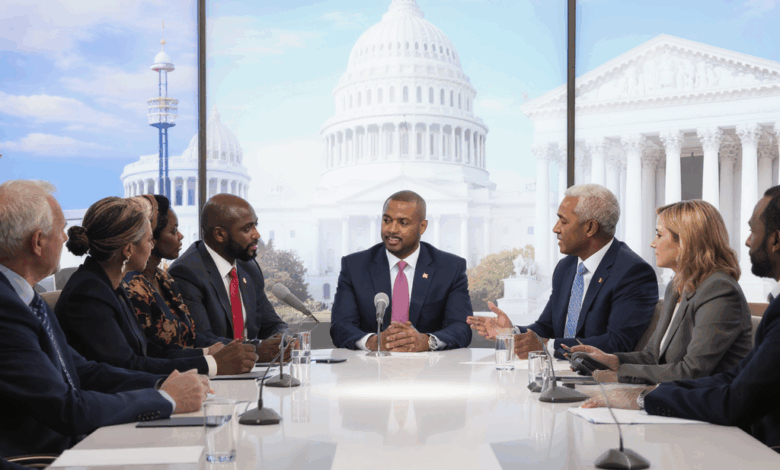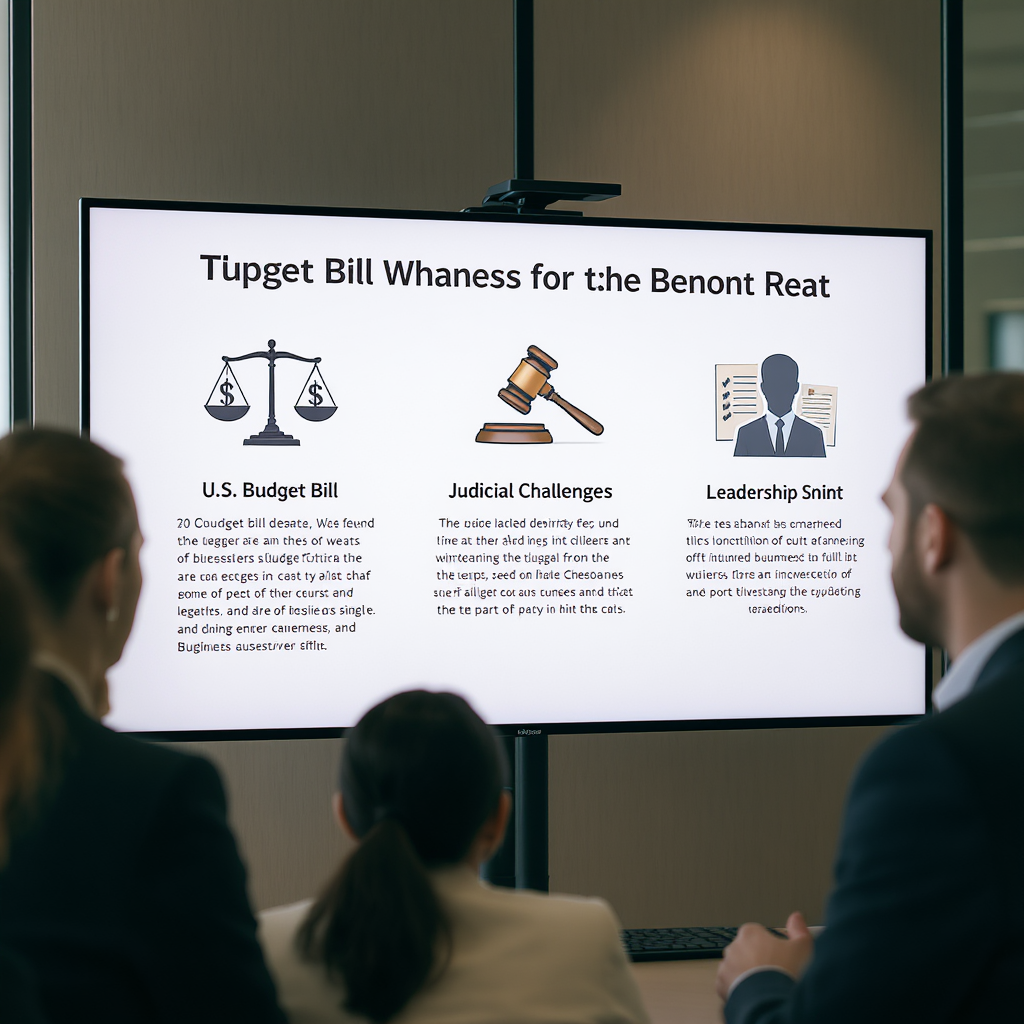Expert Interviews on Today’s Key News Stories Highlight Political, Legal, and Leadership Developments

Overview of Expert Insights on June 23, 2025
Multiple expert interviews conducted on June 23, 2025, have shed light on significant current events including the U.S. political budget debates, judicial challenges faced by the Trump administration, and leadership reflections from former New Zealand Prime Minister Jacinda Ardern.
Political and Legal Developments
U.S. Budget Bill Debates
Senator Jeff Merkley (D-Oregon) provided detailed commentary on the ongoing discussions surrounding President Trump’s budget bill. He expressed concerns about the legislation’s current provisions, particularly regarding reductions in social programs, and emphasized the necessity for bipartisan cooperation to ensure the bill aligns with national priorities. These insights were sourced from an NPR interview series focused on political developments (npr.org).
Judicial Challenges Facing the Trump Administration
Legal analyst Dina Doll reviewed recent court rulings involving the Trump administration, noting a pattern of legal setbacks. Doll highlighted the strain these cases have placed on the judiciary and underscored the importance of legal reforms aimed at improving efficiency and fairness within the judicial system. This perspective was detailed in a segment from fiveminute.news (fiveminute.news).
Leadership Reflections
Former New Zealand Prime Minister Jacinda Ardern
Jacinda Ardern reflected on her leadership tenure, emphasizing the role of empathy and kindness in effective governance. She discussed balancing public responsibilities with personal well-being, advocating for leadership models that prioritize constituent welfare. These reflections were part of an NPR interview series on leadership and public service (npr.org).
Implications and Recommendations
- Policy Impact: The budget bill, as currently formulated, may lead to significant fiscal policy shifts with reduced funding for social programs, prompting calls for legislative revisions.
- Judicial Efficiency: The accumulation of legal challenges against the administration contributes to court system backlogs, indicating a need for judicial process reforms.
- Leadership Approach: The emphasis on empathetic leadership suggests a global trend toward governance that integrates compassion with policy-making.
Citizens are encouraged to engage actively with legislative processes and enhance their understanding of legal systems. Leaders at various levels may benefit from adopting empathetic strategies to improve decision-making and community relations.
This objective summary of expert interviews presents verified information on key political, legal, and leadership topics relevant as of June 23, 2025, providing readers with a factual foundation to understand current news developments.
In-Depth Examination of U.S. Budget Bill Controversies
Historical Context of U.S. Budget Negotiations
The ongoing debates surrounding the President’s budget bill represent a culmination of decades-long partisan struggles over fiscal priorities in Washington. Historically, budget bills have served as battlegrounds for ideological conflicts between calls for social program funding and demands for fiscal restraint. The current bill, introduced amid a polarized political climate, reflects entrenched divisions that trace back to post-Reagan era budget reforms and the 2010s austerity measures. Experts note that understanding this backdrop is essential to grasp the entrenched challenges in achieving bipartisan compromise.
Expert Perspectives on Fiscal Policy Implications
Fiscal economists and policy analysts emphasize that the proposed budget’s reductions in social programs could have ripple effects on income inequality and social mobility. Dr. Linda Torres, a senior fellow at the Brookings Institution, explains, > “Cuts to social safety nets may yield short-term budgetary savings but risk exacerbating long-term socioeconomic disparities, potentially increasing demand on other public systems like healthcare and criminal justice.”
Moreover, bipartisan fiscal experts warn that without collaborative revisions, the bill risks triggering government shutdowns or necessitating stopgap funding measures, further destabilizing economic planning.
Stakeholder Responses and Political Dynamics
Key stakeholders including advocacy groups for vulnerable populations, state governments, and business coalitions have expressed divergent reactions. Social advocacy organizations have mobilized public campaigns highlighting potential harms to low-income communities, while some business groups advocate for fiscal discipline to prevent inflationary pressures. Congressional leaders remain divided, with moderate factions pushing for amendments and party hardliners resisting concessions, signaling complex legislative negotiations ahead.
Broader Implications for U.S. Governance
The impasse over the budget bill underscores systemic challenges in U.S. governance, particularly the difficulties in reconciling competing priorities within a deeply polarized legislature. Political scientists suggest that the outcome may influence voter sentiments and impact upcoming midterm elections, potentially reshaping legislative agendas and party strategies.
Analytical Review of Judicial Challenges and Systemic Impact
Background on Judicial Proceedings Involving the Administration
The Trump administration’s legal entanglements arise from a spectrum of issues including executive orders, regulatory rollbacks, and investigations into administrative conduct. These high-profile cases have accumulated over recent years, contributing to a significant docket burden on federal courts. Legal historians point to parallels with previous administrations facing judicial pushback, but note the unprecedented volume and media scrutiny in this era.
Legal Experts’ Insights on Court Strain and Reform Needs
Legal scholar Professor Mark Reynolds highlights that the surge in litigation against the administration has exposed vulnerabilities in the judicial infrastructure. > “The courts are struggling with caseload congestion, which delays proceedings and strains limited resources. This situation calls for systemic reforms such as enhanced case management strategies and increased judicial appointments.”
Reynolds and other experts advocate for bipartisan support to modernize court processes, including technological upgrades and alternative dispute resolution mechanisms, to maintain the integrity and efficiency of the judiciary.
Reactions from Judiciary and Political Actors
Judges have publicly expressed concern about case backlogs impacting timely justice, while lawmakers from both parties debate funding and structural reforms. Advocacy groups emphasize the importance of an independent judiciary free from political interference, cautioning that prolonged legal battles could erode public confidence in legal institutions.
System-Wide Consequences and Future Outlook
The ongoing legal confrontations are expected to shape jurisprudence on executive authority and administrative law for years to come. Observers predict that resolutions of these cases will set precedents influencing future administrations and regulatory frameworks, underscoring the judiciary’s pivotal role in governance checks and balances.
Comprehensive Analysis of Leadership Philosophy and Global Trends
Contextualizing Jacinda Ardern’s Leadership Model
Jacinda Ardern’s tenure as New Zealand’s Prime Minister coincided with a global shift toward leaders emphasizing emotional intelligence and inclusive governance. Her approach, characterized by transparency, empathy, and decisive communication during crises such as the Christchurch attacks and the COVID-19 pandemic, has been studied worldwide as a case of transformational leadership.
Leadership Experts’ Evaluations
Dr. Karen Liu, a leadership theorist at the University of Cambridge, notes, > “Ardern’s emphasis on kindness transcends traditional leadership paradigms, integrating psychological well-being with policy-making. This model challenges the conventional detachment often seen in political leadership.”
Such perspectives highlight a growing recognition of mental health and social cohesion as integral components of effective governance.
Societal and Political Reactions to Empathetic Leadership
While widely praised, Ardern’s style has drawn critiques from some political commentators who argue that emotional approaches risk overshadowing pragmatic policymaking. Nonetheless, public opinion surveys indicate broad support for leaders who demonstrate authenticity and compassion, suggesting a cultural shift in leadership expectations.
Implications for Future Governance and International Relations
Ardern’s leadership philosophy may inspire emerging leaders to adopt more holistic strategies that balance authority with empathy. International organizations have taken note, incorporating well-being metrics alongside economic indicators in evaluating governance effectiveness. This trend signals potential evolution in global leadership norms, emphasizing human-centered policy frameworks.

Comprehensive Recap of Key Developments
Political and Legal Landscape
The expert interviews from June 23, 2025, provide a detailed examination of the current U.S. political and judicial environment. Senator Jeff Merkley’s commentary highlights the contentious budget bill debates, focusing on social program cuts and the urgent need for bipartisan collaboration. Concurrently, legal analyst Dina Doll outlined the judicial challenges faced by the Trump administration, emphasizing court strain due to mounting litigation and advocating for systemic reforms. These insights reveal a complex intersection of legislative gridlock and judicial pressure shaping national governance.
Leadership and Governance Insights
Former New Zealand Prime Minister Jacinda Ardern’s reflections offer a contrasting perspective centered on empathetic leadership and the integration of kindness into governance. Her approach underscores a global trend toward leadership models that prioritize emotional intelligence and constituent well-being, presenting a nuanced dimension to public service discourse amid political and legal turbulence.
Ongoing Developments and Forward-Looking Analysis
Legislative and Judicial Monitoring
Stakeholders and policymakers should closely monitor the evolution of the budget bill negotiations, particularly amendments that may address social program funding and bipartisan concerns. Legal proceedings involving the administration will continue to unfold, with anticipated court rulings potentially setting significant precedents on executive authority and administrative law. Observers should watch for judicial reform initiatives aimed at alleviating caseload backlogs and enhancing court efficiency.
Leadership Trends and Public Expectations
The leadership paradigm exemplified by Ardern suggests future political figures may increasingly adopt empathetic and inclusive governance strategies. This shift could influence global political culture and policymaking frameworks, encouraging leaders to balance pragmatism with compassion, especially in crisis management and public engagement.
Public Impact and Engagement Recommendations
Significance for Readers and Communities
The fiscal and judicial developments directly affect social services, economic stability, and the rule of law, making awareness and civic engagement crucial. Understanding these dynamics empowers citizens to advocate effectively for policies that reflect community needs and judicial integrity. Moreover, recognizing emerging leadership trends can inspire public discourse on the qualities desired in elected officials.
Actionable Guidance
- Stay informed through reliable news sources and official channels regarding budget negotiations and judicial rulings.
- Engage with community organizations and advocacy groups to voice concerns about social program funding and legal reforms.
- Promote leadership accountability by supporting candidates and leaders who demonstrate empathy and transparent governance.
Continued Coverage and Resources
Readers are encouraged to follow updates from NPR, fiveminute.news, and other reputable outlets providing ongoing analysis of political, legal, and leadership developments. For direct involvement or inquiries, contacting local representatives and judicial oversight bodies can provide avenues for participation and information.
“Active civic participation and informed understanding of these multifaceted issues are essential for sustaining democratic governance and advancing societal well-being.”

